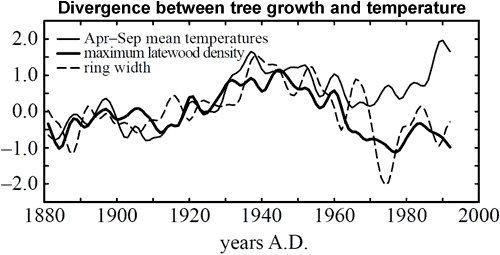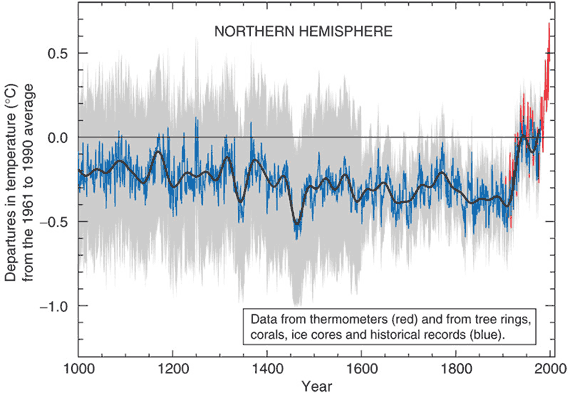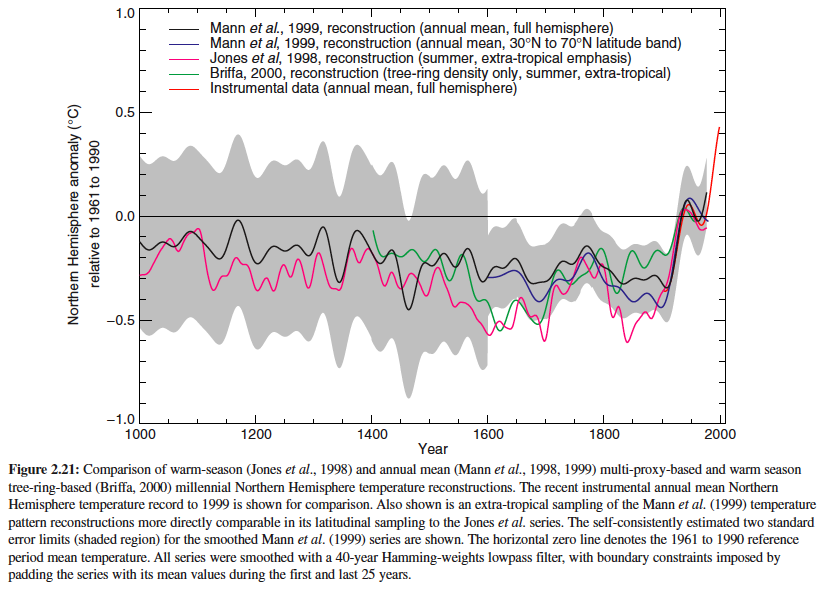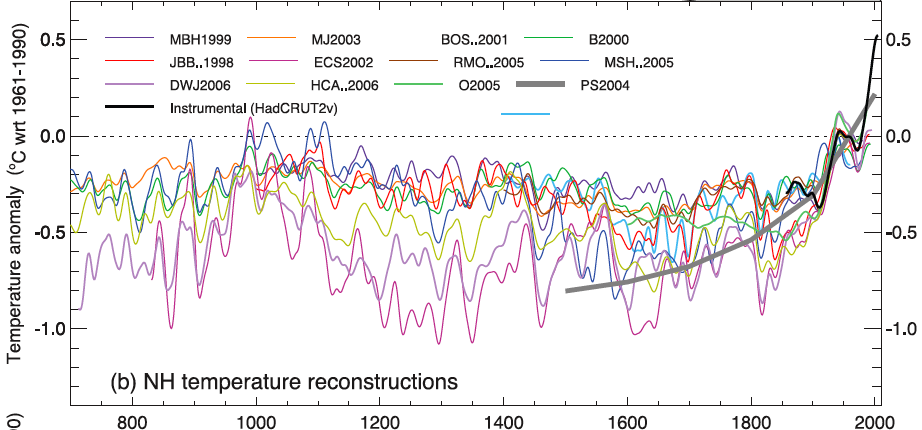Clearing up misconceptions regarding 'hide the decline'
What the science says...
| Select a level... |
 Basic
Basic
|
 Intermediate
Intermediate
|
 Advanced
Advanced
| ||||
|
There are a number of misconceptions regarding 'hide the decline':
|
|||||||
Climate Myth...
Scientists tried to 'hide the decline' in global temperature
'Perhaps the most infamous example of this comes from the "hide the decline" email. This email initially garnered widespread media attention, as well as significant disagreement over its implications. In our view, the email, as well as the contextual history behind it, appears to show several scientists eager to present a particular viewpoint-that anthropogenic emissions are largely responsible for global warming-even when the data showed something different.' (David Lungren)
"Hide the decline" has become a slogan for climate skeptics. However, there are several misconceptions concerning this email that give a misleading picture of the science discussed in Phil Jones' email. When one takes the time to read the email and understand the science discussed, the misconceptions are easily put into proper context.
The decline is about northern tree-rings, not global temperature
Phil Jones' email is often cited as evidence of an attempt to "hide the decline in global temperatures". This claim is patently false and demonstrates ignorance of the science discussed. The decline actually refers to a decline in tree growth at certain high-latitude locations since 1960.
Tree-ring growth has been found to match well with temperature and hence tree-rings are used to plot temperature going back hundreds of years. However, tree-rings in some high-latitude locations diverge from modern instrumental temperature records after 1960. This is known as the "divergence problem". Consequently, tree-ring data in these high-latitude locations are not considered reliable after 1960 and should not be used to represent temperature in recent decades.

Figure 1: Twenty-year smoothed plots of tree-ring width (dashed line) and tree-ring density (thick solid line), averaged across a network of mid-northern latitude boreal forest sites and compared with equivalent-area averages of mean April to September temperature anomalies (thin solid line). (Briffa 1998)
Does the divergence problem mean we cannot rely on tree-ring growth as a proxy for temperature in the past? Briffa 1998 shows that tree-ring width and density show close agreement with temperature back to 1880. To examine earlier periods, one study split a network of tree sites into northern and southern groups (Cook 2004). While the northern group showed significant divergence after the 1960s, the southern group was consistent with recent warming trends.
This is a general trend with the divergence problem - trees from high northern latitudes show divergence while low latitude trees show little to no divergence. Before the 1960s, the northern and southern trees tracked each other reasonably well back to the Medieval Warm Period. This suggests the current divergence problem is unique over the past thousand years and restricted to recent decades.
The "decline" has nothing to do with "Mike's trick".
Phil Jones talks about "Mike's Nature trick" and "hide the decline" as two separate techniques. However, people often abbreviate the email, distilling it down to "Mike's trick to hide the decline". Professor Richard Muller from Berkeley commits this error in a public lecture:
"A quote came out of the emails, these leaked emails, that said "let's use Mike's trick to hide the decline". That's the words, "let's use Mike's trick to hide the decline". Mike is Michael Mann, said "hey, trick just means mathematical trick. That's all." My response is I'm not worried about the word trick. I'm worried about the decline."
Muller quotes "Mike's nature trick to hide the decline" as if its Phil Jones's actual words. However, the original text indicates otherwise:
"I’ve just completed Mike’s Nature trick of adding in the real temps to each series for the last 20 years (ie from 1981 onwards) and from 1961 for Keith’s to hide the decline."
It's clear that "Mike's Nature trick" is quite separate to Keith Briffa's "hide the decline". Somehow Jones' original email has morphed into "Mike's nature trick to hide the decline" to the point where even Professor Muller quotes this line as fact.
So what is "Mike's Nature trick"? This refers to a technique (in other words, "trick of the trade") used in a paper published in Nature by lead author Michael Mann (Mann et al 1998). The "trick" is the technique of plotting recent instrumental data along with the reconstructed data. This places recent global warming trends in the context of temperature changes over longer time scales. The temperature reconstruction was extended back to 1000 AD and published in Mann et al 1999 which was reproduced in the IPCC Third Assessment Report, shown below:

Figure 3: Northern Hemisphere mean temperature anomaly in °C (Mann et al 1999).
There is nothing secret about "Mike's trick". Both the instrumental and reconstructed temperature are clearly labelled in Mann's 1998 Nature article, the follow-up Mann et al 1999 and the IPCC Third Assessment Report. To claim this is some sort of secret, nefarious "trick", or worse - to confuse this with "hide the decline" - displays either ignorance or a willingness to mislead.
The "decline" has been openly and publicly discussed since 1995
While skeptics like to portray "the decline" as a phenomena that climate scientists' have tried to keep secret, the divergence problem has been publicly discussed in the peer-reviewed literature since 1995 (Jacoby & D'Arrigo 1995).
In Phil Jones' email, he was discussing a graph for the cover of an obscure 1999 World Meteorological Organisation (WMO) report, which depicted both instrumental temperature data and reconstructed temperatures based on tree rings. The Independent Climate Change Email Review examined the email and the WMO report and made the following criticism of the resulting graph (its emphasis):
[T]he figure supplied for the WMO Report was misleading. We do not find that it is misleading to curtail reconstructions at some point per se, or to splice data, but we believe that both of these procedures should have been made plain — ideally in the figure but certainly clearly described in either the caption or the text. [1.3.2]
However, the Review did not find anything wrong with the overall picture painted about divergence (or uncertainties generally) in the literature and in IPCC reports. The Review notes that the WMO report in question “does not have the status or importance of the IPCC reports”, and concludes that divergence “is not hidden” and “the subject is openly and extensively discussed in the literature, including CRU papers.” [1.3.2]
How do the IPCC portray the temperature reconstructions of Mann and Briffa? In the 2001 Third Assessment Report (TAR), the Chapter 2 of Working Group 1 (WG1) presented reconstructions from Mann et al. (1999), Jones et al. (1998), and Briffa (2000) in Figure 2.21:
 Briffa (2000) included data up to the year 2000, whereas the study's tree ring data presented in this figure is truncated at the year 1960. Section 2.3.2.1 of the IPCC TAR WG1 (Paleoclimate proxy indicators) has a sub-section devoted to a detailed discussion of tree ring data, including the following text (Page 131):
Briffa (2000) included data up to the year 2000, whereas the study's tree ring data presented in this figure is truncated at the year 1960. Section 2.3.2.1 of the IPCC TAR WG1 (Paleoclimate proxy indicators) has a sub-section devoted to a detailed discussion of tree ring data, including the following text (Page 131):
There is evidence, for example, that high latitude tree-ring density variations have changed in their response to temperature in recent decades, associated with possible nonclimatic factors (Briffa et al., 1998a).
The IPCC TAR contains explicit discussion of the shortcomings of high latitude tree rings as an accurate temperature proxy over the past several decades, some possible reasons for the divergence, and how the divergence problem should be treated (by supplementing it with other proxies).
As with the TAR, the tree ring proxy data and divergence problem discussion in the IPCC 4th Assessment Report (AR4) is detailed and explicit. Below is the relevant discussion from AR4 WG1 Section 6.6.1.1 (Page 472-473), emphasis added:
“Several analyses of ring width and ring density chronologies, with otherwise well-established sensitivity to temperature, have shown that they do not emulate the general warming trend evident in instrumental temperature records over recent decades, although they do track the warming that occurred during the early part of the 20th century and they continue to maintain a good correlation with observed temperatures over the full instrumental period at the interannual time scale (Briffa et al., 2004; D’Arrigo, 2006). This ‘divergence’ is apparently restricted to some northern, high latitude regions, but it is certainly not ubiquitous even there. In their large-scale reconstructions based on tree ring density data, Briffa et al. (2001) specifically excluded the post-1960 data in their calibration against instrumental records, to avoid biasing the estimation of the earlier reconstructions (hence they are not shown in Figure 6.10), implicitly assuming that the ‘divergence’ was a uniquely recent phenomenon, as has also been argued by Cook et al. (2004a).”
Again, there is explicit discussion of the divergence problem (even moreso than in the TAR), of its possible causes, and how it should be dealt with scientifically. In this case, the text specifically states that the post-1960 data is excluded from the Briffa et al. (2001) data plotted in Figure 6.10:

The common misconception that scientists tried to hide a decline in global temperatures is false. The decline in tree-ring growth is plainly discussed in the publicly available scientific literature. The divergence in tree-ring growth does not change the fact that we are currently observing many lines of evidence for global warming. The obsessive focus on a short quote, often misquoted and taken out of context, doesn't change the scientific case that human-caused climate change is real.
Intermediate rebuttal written by James Wight
Update July 2015:
Here is a related lecture-video from Denial101x - Making Sense of Climate Science Denial
Last updated on 11 July 2015 by MichaelK. View Archives































 Arguments
Arguments
































Ironbark wrote: "Unless the emails I've read, are not the emails commonly understood, the use of words trick,"
This is a classic example of somebody misunderstanding a scientific comment due to ignorance of scientific terminology. The word "trick" is commonly used to refer to a mathematical or algorithmic device that provides a particularly neat solution to some problem. It has precisely nothing to do with desception. It isn't hard to find examples of this usage, for instance in my field (machine learning) there is a well-known paper called "The Kernel Trick for Distances" and this usage is not at all uncommon, as Google Scholar reveals. Of course the "skeptic" blogs are unable to accept this and happily misrepresent the emails as evidence of intentional desception.
So ironbark, do you accept that the use of the word "trick" does not imply the intent to mislead in a scientific context?
Ironbark, if your impression of climategate emails is based on solely on emails as reported by the misinformation crew, then you are missing some interesting information - like how the misinformation/disinformation sites manipulate you. You might want to check out about:
Selective editing of the emails to cast them in a different light
Manipulation of figures
and strangely omitted emails that provide context. The links allow you to check blog posts against the emails so you can see that there is no further wool being pulled over your eyes.
How do feel about being manipulated like this?
Please note: the basic version of this rebuttal was updated on April 21, 2024 and now includes an "at a glance“ section at the top. To learn more about these updates and how you can help with evaluating their effectiveness, please check out the accompanying blog post @ https://sks.to/at-a-glance